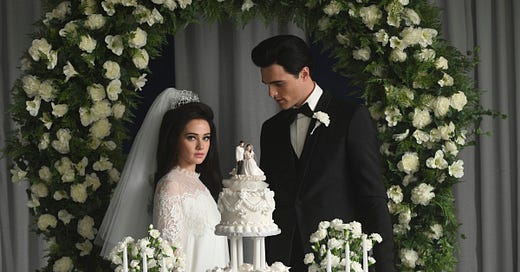Ten or so minutes into my press screening of Priscilla, Sofia Coppola’s latest film, I had to pee. I kept waiting for a convenient time to duck out, when the pace slackened, or there was moment to breathe after a big event. I ended up running to the bathroom as the credits rolled, because I was so riveted by this biopic of Priscilla Presley that there never was a “right” scene to miss. Coppola is a director I’ve always found vaguely to moderately annoying, and this film—which follows its protagonist from a ninth-grader, when she first meets a romantically interested 31-year-old Elvis, to her early twenties, right after she has Lisa Marie—is yet another movie about Coppola’s favorite archetype, the sad dreamy rich (white) girl-woman.
One of the reasons Coppola’s films tend to not work for me is that she’s better at conveying surfaces than interiority. But this story, about Elvis’s molding of a teenager into the bride that he wanted, works well with the director’s skill set because it’s largely about how Priscilla was pressured by her famous and controlling husband into being all surface. Cailee Spaeny and Jacob Elordi, who play the central couple, wholly disappear into their roles, and Elordi blows Austin Butler out of the water in the Elvis Offs. Visually, the midcentury nouveau-riche splendor might be the most I’ve responded aesthetically to a Coppola film. But I think what kept me rapt (and, unfortunately for my bladder, stuck in my seat) was the film’s rhythms — Elvis’s cruel whims and shows of dominance often came out of nowhere, keeping Priscilla on her toes (though, eventually, she learns how to respond more effectively to his manipulations). Anyway, I really can’t think of a better way to convey this recommendation than: I put myself through mild physical discomfort for two hours to catch every second of this movie.
-Inkoo
—It’s been so long since I’ve watched any TV that I’ve felt like pushing on others. And then I saw Showtime’s Fellow Travelers and was enthralled; it’s an exquisite (gay) romance spanning some 30 years, starring Matt Bomer and an incandescent Jonathan Bailey, and I’ve been unable to stop talking about it since I saw the first episode. My extremely enthusiastic review here.
—I also contributed some smaller TV and film recommendations this week to The New Yorker’s Goings On newsletter, a round-up of notable cultural happenings. (Scroll to the bottom of the link.)
—“China’s Age of Malaise.” A fascinating long-form about the country’s business and government spheres, as well as the larger sense of stasis that pervades the populace. The spate of disappearances of high-profile dissenters was especially chilling.
—“Why'd I take speed for twenty years?” I’ve recommended the Search Engine podcast before on this newsletter (maybe even more than once), but at the risk of repeating myself, this was so good. Host P.J. Vogt talks about his own history with amphetamines—following a questionable diagnosis of ADHD as a preteen—and chronicles the long history of this potent drug, which has often been a medication in search of a disease.
—“The ‘Organized Retail Crime ‘Panic.” This episode of one of my favorite podcasts, If Books Could Kill, about bad ideas that get popularized through bestsellers, is admittedly a bit of a hard sell because it’s paywalled via Patreon (though scalable for just $4). I decided to include it here anyway because it’s legitimately the most interesting thing I’ve encountered in the past couple of weeks, and since the organized-retail-crime narrative has focused so heavily on downtown San Francisco, it’s a subject that impacts me directly as a Bay Area resident. Anyway, this is a fantastic debunking of the incredibly faulty stats that ginned up a crime spike that never happened, but made national headlines this year anyway.





Honestly, I thought you were talking about the Austin Butler movie because I had forgotten there was another one on the way. I look forward to watching this one, too!